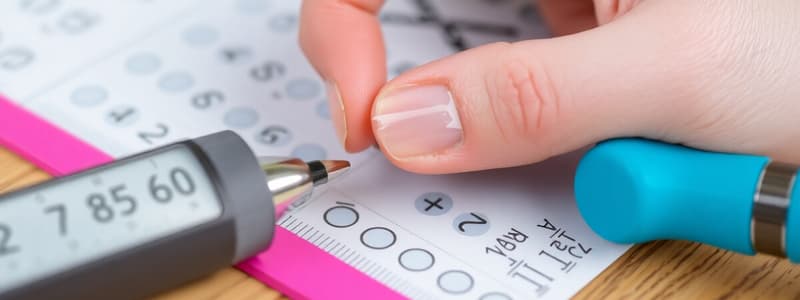Podcast
Questions and Answers
What is the primary purpose of the standard error of estimate?
What is the primary purpose of the standard error of estimate?
- To indicate the accuracy of predictions made by the test (correct)
- To assess the item difficulty of a test
- To determine the test's validity
- To measure the average score of a test
Which of the following is NOT a major method for establishing the reliability of a test?
Which of the following is NOT a major method for establishing the reliability of a test?
- Split-half reliability
- Parallel forms reliability
- Item response theory (correct)
- Test-retest reliability
Which type of validity focuses on how well a test corresponds with a specific criterion measured at the same time?
Which type of validity focuses on how well a test corresponds with a specific criterion measured at the same time?
- Discriminant validity
- Concurrent validity (correct)
- Content validity
- Convergent validity
Which formula is specifically associated with assessing the reliability of tests with dichotomous choices?
Which formula is specifically associated with assessing the reliability of tests with dichotomous choices?
What differentiates item response theory from classical test theory in test construction?
What differentiates item response theory from classical test theory in test construction?
Which of the following best describes the fundamental purpose of norms in psychological testing?
Which of the following best describes the fundamental purpose of norms in psychological testing?
A researcher develops a new test to measure anxiety but discovers that it correlates highly with existing depression scales. This primarily threatens the test's:
A researcher develops a new test to measure anxiety but discovers that it correlates highly with existing depression scales. This primarily threatens the test's:
In test score theory, the domain sampling model primarily addresses the challenge of:
In test score theory, the domain sampling model primarily addresses the challenge of:
What situation would make using the split-half reliability method most appropriate?
What situation would make using the split-half reliability method most appropriate?
Which scenario exemplifies criterion-referenced testing?
Which scenario exemplifies criterion-referenced testing?
Which concept is LEAST directly addressed by the domain sampling model in test score theory?
Which concept is LEAST directly addressed by the domain sampling model in test score theory?
A test is found to have high reliability but consistently fails to predict future job performance. What type of validity is MOST likely compromised?
A test is found to have high reliability but consistently fails to predict future job performance. What type of validity is MOST likely compromised?
When is the KR-20 formula most appropriately used to estimate reliability?
When is the KR-20 formula most appropriately used to estimate reliability?
Which of the following BEST describes the purpose of calculating an item discrimination index?
Which of the following BEST describes the purpose of calculating an item discrimination index?
How does item response theory (IRT) primarily improve upon classical test theory (CTT) in test construction?
How does item response theory (IRT) primarily improve upon classical test theory (CTT) in test construction?
Flashcards
Test-retest reliability
Test-retest reliability
How well a test measures the same construct over time. It's like taking the same quiz multiple times, hoping your score stays consistent.
Parallel forms reliability
Parallel forms reliability
A method for estimating how consistently a test measures a skill or trait. Think of it as measuring a ruler against another one to see if they align perfectly.
Criterion-based test
Criterion-based test
A test that compares a person's score to a predefined standard or criteria, rather than comparing it to the scores of others.
Split-half reliability
Split-half reliability
Signup and view all the flashcards
Standard Error of Measurement
Standard Error of Measurement
Signup and view all the flashcards
What is a test?
What is a test?
Signup and view all the flashcards
Validity
Validity
Signup and view all the flashcards
Study Notes
Midterm #1 Study Notes
- Standard error of estimate and measurement: Definition and discussion of these concepts.
- Test Reliability Methods: Descriptions of methods used to establish test reliability.
- Test Definition and Types: Definition and examples of different types of tests. This includes different types of scales, norms, norm-referenced, and criterion-based tests.
- Test Purchaser Competencies: Three levels (A, B, C), associated training, and test types.
- Construct, Convergent, and Concurrent Validity: Definitions and understanding of these types of validity.
- Criterion, Discriminant, and Face Validity: Definitions and distinctions between these types of validity.
- Measurement Error Sources: Identifying sources of error in measurement.
- Kuder-Richardson-20 and Spearman-Brown Formula: Details on these calculation formulas, and their uses.
- Item Response Theory: Definition and description, comparison to classical test construction.
- Scale Types and Norms: Different types of scales and norms, including norm-referenced and criterion-based tests.
- Test Score Theory: Understanding of domain sampling model, error sources, item response theory, test-retest reliability, parallel forms reliability, split-half reliability, KR20 formula, and Cronbach's Alpha, with standard error of measurement calculation.
- Reliability Calculation Methods: Test-retest, parallel forms, split-half, KR20, Cronbach's Alpha, and standard error of measurement. A table showing these methods may be useful.
- Validity Types: In-depth knowledge of construct, convergent, concurrent, criterion, predictive, content, discriminant, and face validity. A table for each type of validity may be beneficial.
- Item Analysis: Explanation of item difficulty, discrimination index, and item response theory.
Studying That Suits You
Use AI to generate personalized quizzes and flashcards to suit your learning preferences.




